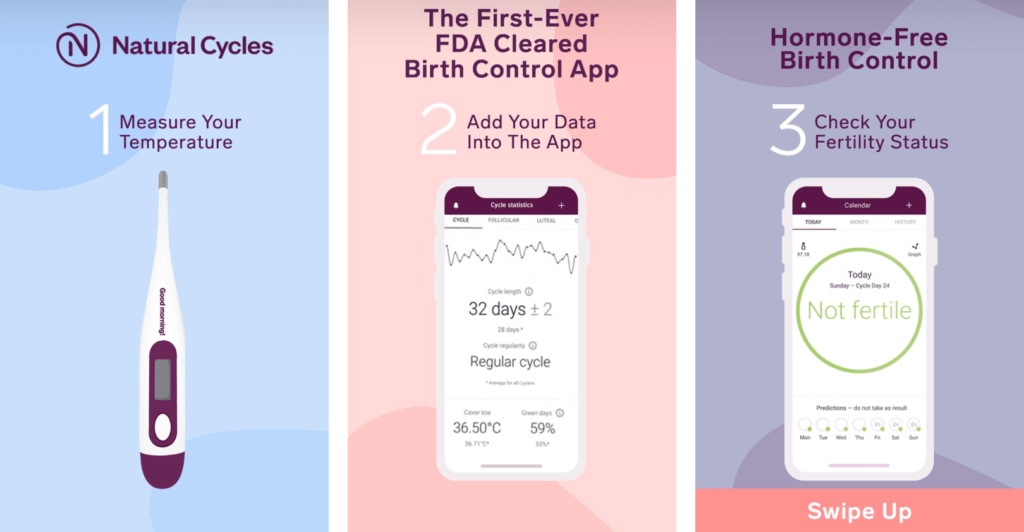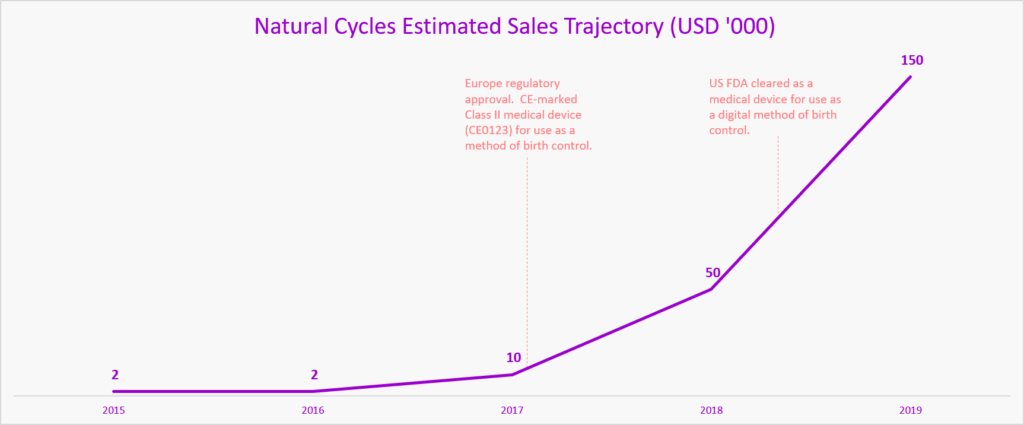Birth Control and Baby Planning – There’s an app for both

Natural Cycles is a natural fertility tracking app and the first and only digital contraception app to receive regulatory approval (certified in Europe and FDA-cleared in the US). It’s disrupting big pharma birth control by replacing “the pill” and has raised $38.5M in venture capital so far.
Global fertility is a $25B industry[1] and the market for contraception is valued at $17B/year with the pill valued at $6B/year[2]. Yet, big pharmaceutical companies have largely de-emphasized innovation in this area. The rise of digital health innovation in combination with women’s empowerment movements has paved the way for the emergence of femtech in recent years, poised to become a $50B market by 2025[3].
The Winner: Natural Cycles
Founded in 2014, Natural Cycles was created because there was a large unmet need of women looking for a natural and effective method of contraception[4]. Fertility awareness methods are not new and other apps exist (including Apple’s new Cycle Tracking app[5]), but Natural Cycles stands out because it uses a basal thermometer and an app with an algorithm to learn the user’s unique cycle in order to predict her fertility window.

Natural Cycles creates value for its consumers in a variety of ways:
- No side-effects: Traditional hormone-based contraceptives come with potential undesirable side effects, as well as increased risk of blood clots[6].
- Non-invasive: Unlike IUD, implants, the ring, and other invasive forms, there is no associated physical discomfort nor risk of infection.
- Effective: Natural Cycles is proven to be as effective as the pill with typical use[7], 98% effective with perfect use, and more effective than traditional fertility awareness methods[8].
- Works both ways: Although it is primarily marketed as birth control, the app can also be used to help plan pregnancy because of its ability to predict ovulation.
- Increased health awareness: Women are empowered to learn more about their health from the app’s output. This knowledge gives a feeling of control and increases the likelihood that the user will recognize unusual fluctuations. As the AI improves, there are opportunities for additional services including signaling when to seek medical help.
- No Rx required: Direct-to-patient.
- Transparency: The company is straightforward in communicating that it is not the most effective contraceptive and goes so far as to compare its efficacy with other forms. This builds consumer trust and encourages them to make more informed decisions for their individual needs. All relevant studies are also available to view on the company’s website – quite the opposite practice of big pharma’s opacity.
- Engagement: The app’s game/achievement aspect incentivizes users to input data regularly to learn more about themselves.
Natural Cycles captures value through its subscription business model which includes an annual option for $90/year (majority of users) and a monthly option for $9.99/month. On a more controversial note, while the company claims to not share or sell subscriber data, it benefits from collecting data from its users for further research.

The Loser: Big Pharma
Big pharma has largely been asleep in the area of women’s health. Only 4% of worldwide R&D funding in healthcare products is invested in women’s health[9]. It is not surprising then that there has been little innovation – it has been nearly 60 years since hormonal contraception was invented with only incremental improvements since then. The pharma giants in birth control including Bayer, Merck, Allergan, Pfizer, and Teva stand to lose if they underestimate the threat of Natural Cycles and other early stage femtech fertility apps even if only in a stage of nascent growth.
Although Natural Cycles is not a 100% effective nor the ideal solution for every woman, its growth suggests that the door is opening for a shift towards more transparency about the effects of birth control and transforming the way both businesses and consumers approach women’s health. It is empowering women with knowledge and choice regarding their health and it is subsequently driving women to demand more transparency and more personalized solutions from big pharma companies with regards to both existing product offerings and potential innovation.
[1] “The tech behind the First FDA-Approved Birth Control App,” September 13, 2019, video file, Bloomber Technology – TV Shows, https://www.bloomberg.com/news/videos/2019-09-13/the-tech-behind-the-first-fda-approved-birth-control-app-video, accessed September 2019.
[2] “Global Contraceptive Pills Market,” press release, August 23, 2019, Globe Newswire, https://www.globenewswire.com/news-release/2019/08/23/1906065/0/en/Global-Contraceptive-Pills-Markets-2013-2018-2019-2024.html, accessed September 2019.
[3] “Femtech: Digital Revolution in Women’s Health,” Frost & Sullivan, https://ww2.frost.com/files/1015/2043/3691/Frost__Sullivan_Femtech.pdf, accessed September 2019.
[4] Esmé E Deprez, “It’s tough being the first birth control app,” Bloomberg Businessweek, April 1, 2019, https://www.bloomberg.com/news/features/2019-04-01/birth-control-app-natural-cycles-is-more-effective-than-the-pill, accessed September 2019.
[5] Mary Meisenzahl, “Apple is finally launching a cycle tracker this week, and there’s compelling reason to use it over third-party apps,” Business Insider, September 27, 2019, https://www.businessinsider.com/apple-cycle-tracking-app-ios-13-watchos-6-launch-2019-9, accessed September 2019.
[6] Institute for Quality and Efficiency in Health Care (IQWiG), “Contraception: Hormonal contraceptives,” InformedHealth.org, June 29, 2017, https://www.ncbi.nlm.nih.gov/books/NBK441576/, accessed September 2019.
[7] Natural Cycles, “Natural Cycles: Take Birth Control Into Your Own Hands,” https://www.naturalcycles.com/, accessed September 2019.
[8] Planned Parenthood, “Birth Control,” https://www.plannedparenthood.org/learn/birth-control, accessed September 2019.
[9] Renita Das, “Femtech Fights Gender Equality: How Do Social Determinants of Health Impact Women?,” Forbes, March 7, 2019, https://www.forbes.com/sites/reenitadas/2019/03/07/femtech-fights-gender-equality-how-do-social-determinants-of-health-impact-women/#75c8a00c293f, accessed September 2019.



Important topic and great perspective. I’m shocked at how effective simple cycle planning can be at contraception. Once more shows the power of using ML on the right data. Really cool that it also can be used for improving odds of pregnancy as well. Thanks for sharing!
Great post on a really important topic. I am a male so I can’t speak from first-hand experience but am aware that some pharmaceutical methods of birth control can radically alter the user’s hormones, potentially resulting in a plethora of unwanted side-effects if not serious health issues. A “softer” solution that doesn’t involve powerful drugs seems like an extremely important option that should definitely be available to consumers. I wonder about pricing though. Sure, $90 per year is probably much less than the cost of prescription drugs; however, couldn’t this app be free? I am curious about the tech stack and what it would take to produce some competitive free-ware. Such an important service should be available to everyone with no exceptions. Likewise, I am curious about the plans for the ~$40M and how the company plans to expand, what other products and services they might offer. Do they plan to provide hardware, like the thermometers? Would it be possible to have a thermometer that syncs with the app over wifi to provide a seamless experience?
Thank you for this article: it is an interesting and important topic. It is a perfect example of ML applied to an unexpected area and I am convinced the technology will be improved to match -if not outperform- the existing contraception methods. My only concern would be on the cost: do you know if the company plans to partner with the National Health Service in the future? One possible outcome could be to have its membership fee covered by NHS and for Natural Cycles to be offered for “free” to users -as it is the case with the contraception pills nowadays.